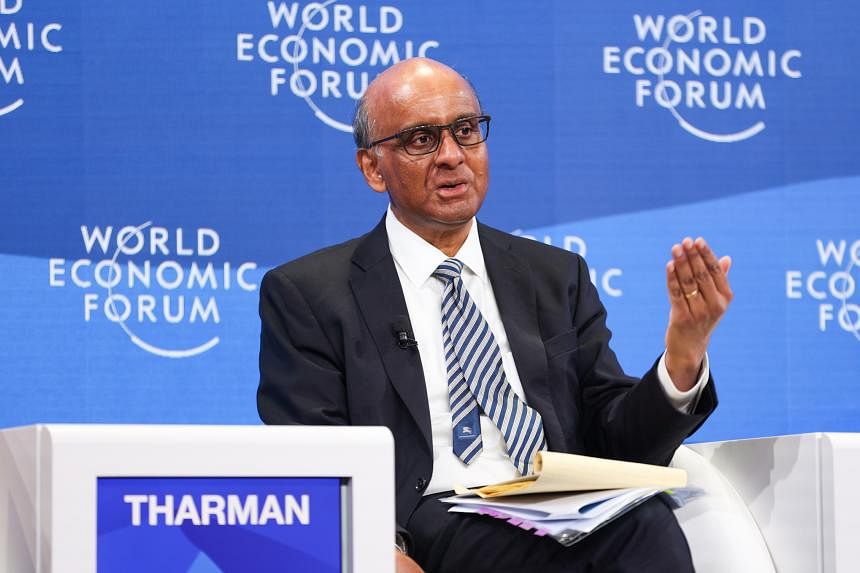DAVOS, Switzerland - To have policies that succeed in developing and growing the economy, they must be accompanied by social policies at an industrial scale.
A systematic approach is needed to developing human capital, which requires first and foremost education systems that provide high-quality education for all, said President Tharman Shanmugaratnam at a panel discussion at the World Economic Forum (WEF) in Davos, Switzerland, on Jan 17.
In today’s environment, this will require the constant replenishing of skills, which is hard to get right, as it is not possible to bet on specific skills that will be relevant five or 10 years from now, he noted.
But broadly speaking, the areas of digitalisation, artificial intelligence and green energy are going to be important, and there are clusters of skills required for these, he said.
He was responding to a question on how Singapore, which is known for its public sector and private sector skills, takes on long-term bets and builds up the human capital and capabilities needed for those.
Mr Tharman said: “You might not get it precisely right, but you can get it roughly right. We have to do that with some gusto. And that too requires the public sector to participate in the game. It requires mobilising employers, and motivating individuals.”
In contrast, countries that focus purely on industrial policy – for instance, by encouraging investors to set up a plant in a particular town – will find over time that it will cost more and more, as they will not have the skills ecosystem to sustain it, he added.
The panel, consisting of former and current government members, economists and private sector representatives, was discussing the role and impact of governments as investors on the private sector.
Panel moderator Saadia Zahidi, managing director at WEF, had observed that there are people, even in advanced economies, who are not confident their governments have the skills and capabilities to make the right long-term big bets, even if they are thinking of the public good.
Mr Tharman noted that today’s industrial policies risk crowding out other countries.
While some of the motivation for these policies is good, such as to drive down the costs of low-carbon or zero-carbon technologies, the other motivation, often undisguised, is geopolitical.
“It’s about achieving a lead over someone else,” he said. “It’s a complicated game. Countries with the deepest pockets, or the ability to borrow the largest amounts of money without suffering a credit rating loss, are at an advantage over the rest.”
For example, a country that offers subsidies that lower the cost of energy would be at an advantage over another country with policies like carbon taxes to incentivise the use of low-carbon technology over fossil fuels.
“Realistically, countries do want to be ahead of others. But at least 80 per cent of their efforts has to be in developing their capabilities rather than in making sure someone else doesn’t catch up,” said Mr Tharman.
On the topic of governments as investors, Dr Lee Kai-Fu, founder of Chinese start-up 01.AI, which builds large language models, said there were benefits to getting governments involved as such.
They have the means to bet on technological trends with a view to the long term and patience to wait it out that can lead to big success.
“The private sector cannot do that. I’m a private sector investor, and if I invested that way, the fund will be out of business very quickly,” he said.
And even if the long-term investments do not pan out, they serve the important function of creating a brain trust.
He cited the example of China, which in 2005 rolled out a major national initiative to invest in new energy technology, such as new types of batteries and solar panels.
This has become a successful industry today, with China having 80 per cent of the world’s solar panel market share and many of the largest battery companies, but it was 18 years in the making, he said.
Many companies funded back then actually did not succeed, he added.
“But that created a brain trust so that when the timing became right, they came back and built some of the best solar panel companies,” said Dr Lee.
The risk for governments is that waiting 10 or 15 years for a return on its investment may lead to criticism or cause cost challenges, he added.
Mr Faisal Alibrahim, minister of economy and planning in Saudi Arabia, said there is now momentum to think long-term about solving challenges such as climate action and technological disruption, and that gives rise to opportunities for both the public and private sectors to work together.
“But that definitely means we should be okay with the private sector profiting and using that profit to good use, and we should be okay with governments becoming a stronger partner with the private sector,” he said.


